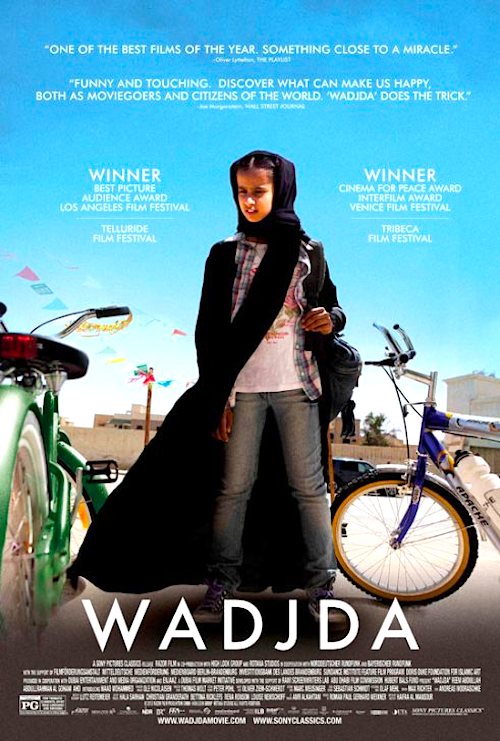By Joe Bendel. In a country where women are forbidden to drive cars and movie theaters are prohibited, this is obviously a significant two-fer. Not only is it considered the first feature film produced entirely in Saudi Arabia, it was also directed by a woman. (It should be noted that the film was partly backed one of the prince’s companies, lest you suspect that the Zionist conspiracy was working overtime.) It might not drag Saudi Arabia into the modern world, but at least Haifaa Al Mansour’s Wadjda is a good film well worth seeing when it opens this Friday in New York.
Ten year old Wadjda’s attends a hardline Islamist girls’ school that has little to teach beyond the Koran. Bless her heart, she is a terrible student, but obviously much more interesting than her docile classmates. Everyone is rather surprised when she enrolls in the school’s Koran reciting competition, but she has plans for the prize money. She is determined to buy the sparkling new green bicycle that caught her eye.
 Of course, biking is strictly not allowed for girls. After all, those narrow seats might rob them of their virtue. Seriously, that is the justification. Nevertheless, Wadjda convinced her neighborhood friend Abdullah to secretly teach her how to ride his bike. Thanks to the circumstances of her family life, she will have plenty of time to spend with him. Her loving mother works on the other side of town, forced to rely on her surly driver to shuttle her back and forth. In contrast, Wadjda’s father is an infrequent presence in her life. He lives with his mother, who seems to be plotting a second marriage for her son. Wadjda’s mother lives in fear of this nuclear option.
Of course, biking is strictly not allowed for girls. After all, those narrow seats might rob them of their virtue. Seriously, that is the justification. Nevertheless, Wadjda convinced her neighborhood friend Abdullah to secretly teach her how to ride his bike. Thanks to the circumstances of her family life, she will have plenty of time to spend with him. Her loving mother works on the other side of town, forced to rely on her surly driver to shuttle her back and forth. In contrast, Wadjda’s father is an infrequent presence in her life. He lives with his mother, who seems to be plotting a second marriage for her son. Wadjda’s mother lives in fear of this nuclear option.
Wadjda is a gentle coming of age story, but it is bursting with telling moments. Perhaps the greatest eye-opener is the extent to which women, such as Wadjda’s shrewish head mistress Ms. Hussa, enable and promote their society’s institutionalized misogyny. Time and again, Wadjda’s mother faces major dramas over what would be mere day-to-day chores for women in the west, because of her gender restrictions. It is also hard to see what use Wadjda’s Islamist education will ever be, but that is obviously the whole point.
Nonetheless, both Wadjda and Abdullah (played by Waad Mohammed and Abdullrahmin Algohani, respectively) represent the promise of youth. Given her extensive screen time, Mohammed is particularly impressive, largely carrying the film with aplomb, but they are both immensely likable, blessed with natural screen charisma. Watching their chemistry develop gives viewers hope, but they are only two kids.
While Wadjda the film is understandably small in scope, there are considerable stakes involved for mother and daughter alike. Monsour tells a timely and compelling story with a sure directorial hand and a sensitive touch.Indeed, the indomitable Wadjda is a remarkably engaging character who ought to win over art house audiences. Highly recommended, particularly for those interested in global women’s rights issues, Wadjda opens this Friday (9/13) in New York at the Lincoln Plaza Cinema.
LFM GRADE: A-
Posted on September 9th, 2013 at 3:44pm.